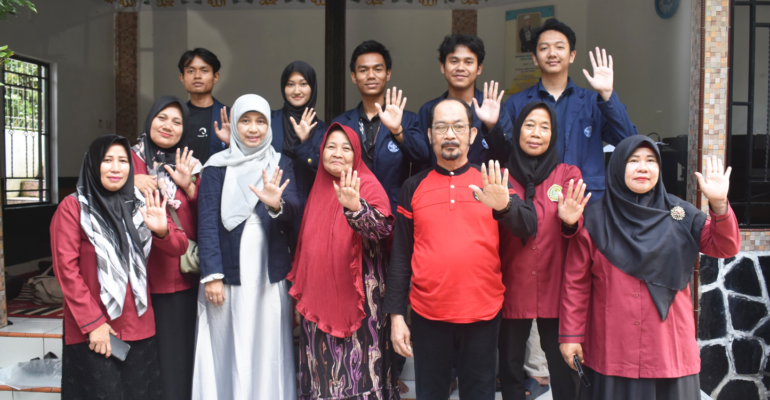Bluetanics, IPB University Student Program to Help Rehabilitation of Patients with Mental Disorders (ODGJ) with Plant Therapy

IPB University students participating in the Student Creativity Program for Community Service or program Kreativitas Mahasiswa bidang Pengabdian Masyarakat (PKM PM) designed the Bluetanics program to help the rehabilitation process of patients with mental disorders or Orang Dalam Gangguan Jiwa (ODGJ). Bluetanics is a program to strengthen self-confidence and catharsis for Patients with mental disorders or ODGJ through plant therapy.
The service of IPB University students was carried out at Bina Tauhid Foundation (Darul Miftahudin) located in Hambaro Village, Nanggung District, Bogor Regency, West Java. This foundation is one of the rehabilitation centers for mental disorders (ODGJ) patients.
“Plant therapy is proven to reduce stress and increase self-confidence and self-esteem for mental disorders (ODGJ) patients. This method can be a catharsis or channeling of negative emotions,” said Raja Muhammad Khairunnas, a representative of the PKM PM team.
The program, he said, is designed so that mental disorders (ODGJ) patients at Bina Tauhid Foundation can have good skills and emotional control after rehabilitation. This is because the current method of patient recovery is not very supportive.
So far, the method given by Bina Tauhid Foundation to patients is 75 percent remembrance and 25 percent medical, the rest are routine activities such as gymnastics on Tuesdays and Fridays. Patients have more free activities when they finish breakfast at 08.30 WIB every day.
“This is the reason why IPB University students chose the foundation to carry out the service,” said Raja.
The Bluetanics program carried out by IPB University students is carried out with the plant therapy method with hydroponic planting media. Through this effort, Raja hopes to increase self-confidence in ODGJ by optimizing rehabilitation services for mental disorders (ODGJ) patients.
In addition, the Bluetanics program is expected to improve self-cognitive abilities about emotions and feelings (catharsis), such as releasing pent-up emotions and understanding delusions that are not real in mental disorders (ODGJ) patients. In addition, the plant therapy method aims to optimize the rehabilitation process and post-rehabilitation treatment, as well as improve skills and social functions in mental disorders (ODGJ) patients.
At the beginning of the arrival until the continuation of the program, there was enthusiasm from all administrators and patients at the foundation. This, said Raja, became an encouragement for IPB University students.
“Hopefully the program provided can bring benefits to the foundation to continue the existing program and benefit the patient’s recovery process,” he said. (IAAS/HLF)



